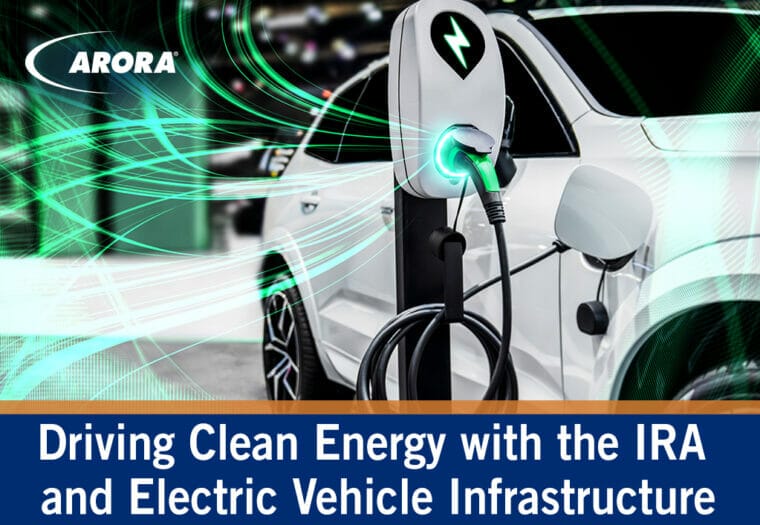News | Oct 04, 2022 | Christyn Binder
Driving Clean Energy with the IRA and Electric Vehicle Infrastructure
H.R. 5376 (117), known as the “Inflation Reduction Act of 2022” (IRA), ratified by President Biden on August 16th, 2022, represents the most substantial climate legislation passed in the USA to date and includes over $370 billion in climate and clean energy investments.
This bill will have important implications for numerous sectors served by the AEC industry, including $2 billion in grants to help convert existing auto manufacturing factories to make electric vehicles and $20 billion of loans for new clean vehicle manufacturing facilities. In addition, the bill includes $60B to be invested in clean energy manufacturing in the US to spur the domestic production of technologies such as batteries, electric vehicles, heat pumps, solar panels, wind turbines, etc. which will lead to the creation of good paying, unionized jobs for US workers.
While tax credits for renewable energy have been in place in the US since the early 1990’s and served as the foundation for much of the wind and solar infrastructure implemented domestically to date, the IRA’s robust, 10-year incentives and programs provide a decade of policy certainty for the clean energy sector and allow organizations to commit to building and implementing the renewable technologies needed to cleanse and decarbonize our power grid.
Arora Engineers (Arora) has long been a proponent of sustainability, and our national engineering teams are thrilled about the opportunities this bill will afford them to help our transportation, aviation, and commercial clients prepare for and implement even more sustainable design practices and technologies. In particular, our electrical engineering group is excited to continue to expand electric vehicle charging infrastructure across the nation. Our team is pleased to see federal legislators have already approved EV Infrastructure Deployment Plans from 35 states across the US, including Washington DC and Puerto Rico, which will give them access to $900M+ in National Electric Vehicle Infrastructure (NEVI) Formula funding for FY 22 and FY 23 to deploy electric vehicle charging stations along highways. According to ENR, these funds will help states realize the Biden administration’s goal of a nationwide network of about 500,000 chargers along 53,000 miles of roads.
Arora is proud to help our clients capitalize on these federal funds, and to draw upon our extensive experience implementing electric vehicle charging stations for large infrastructure projects across the country as well as smaller, stand-alone electric vehicle charging infrastructure in existing urban parking areas to help further progress this movement.
One excellent example is our work at Philadelphia International Airport (PHL)— Arora provided electrical and communications engineering services for the installation of seven new electric vehicle charging stations at PHL, each station can charge two vehicles, which means 14 EVs can be charged simultaneously. We provided similar engineering services for 12 additional charging stations at various Philadelphia Parking Authority garage locations throughout the City of Philadelphia.
Howard Paige, PE, Vice President at Arora Engineers, notes that Hartsfield-Jackson Atlanta International Airport (ATL) is another excellent example of Arora’s electric vehicle charging station expertise, as our team assisted the airport in meeting their sustainability goals with the implementation of 15 electric vehicle charging spaces in their parking facilities, incorporated as part of the MEP design for their new 6,000 space west parking garage. Under a separate contract with ATL, Arora provided engineering studies and planning services for numerous task orders aimed at helping the airport implement their ATL Clean Energy Plan (ACEP), which was created to provide the airport with a strategic roadmap for implementing a comprehensive clean energy-program that emphasized reducing reliance on and consumption of conventional sources of energy, reducing emissions, and increasing the resilience and reliability of energy-delivery systems.
Under this on-call contract, Arora provided engineering services for electrical vehicle charging station telemetrics as well as an electric shuttle bus funding strategy followed by an electrical evaluation and interior electrical routing services study for an electric vehicle charging infrastructure plan and alternate fuel conversion outreach strategy at ATL. Our team also provided electrical engineering services for two reports detailing our review of existing electrical infrastructure near two re-charger locations to accommodate future electric shuttle buses.
Arora is also currently implementing an EV Charging station program for a private client at approximately 20 locations across the country including, determining and coordinating the power and communication/data requirements for the EV Battery Chargers, EV Battery Charger system equipment specification and installation details, Electrical and communications design and electrical feeders and communication/data drops to the building electrical distribution system and IDF connection points within the existing Facilities.
Paige explained that one of the most common challenges our teams face when implementing EV charging stations across the US is that many existing facilities do not have adequate infrastructure in their buildings or power companies to be able to serve the equipment. Our team has overcome these challenges at major airports across the US by upgrading facility electrical distribution systems or adding new Electrical Service Entrances to facilities to accommodate the large EV charging loads. Our team has also implemented EV charger controls to limit EV charger demands within existing electrical distribution systems. We anticipate inadequate power infrastructure will be one of the most common challenges our clients face in the next several years and look forward to helping our clients to engineer thoughtful energy and budget efficient solutions.
To learn more about our capabilities and past experience, click here.



